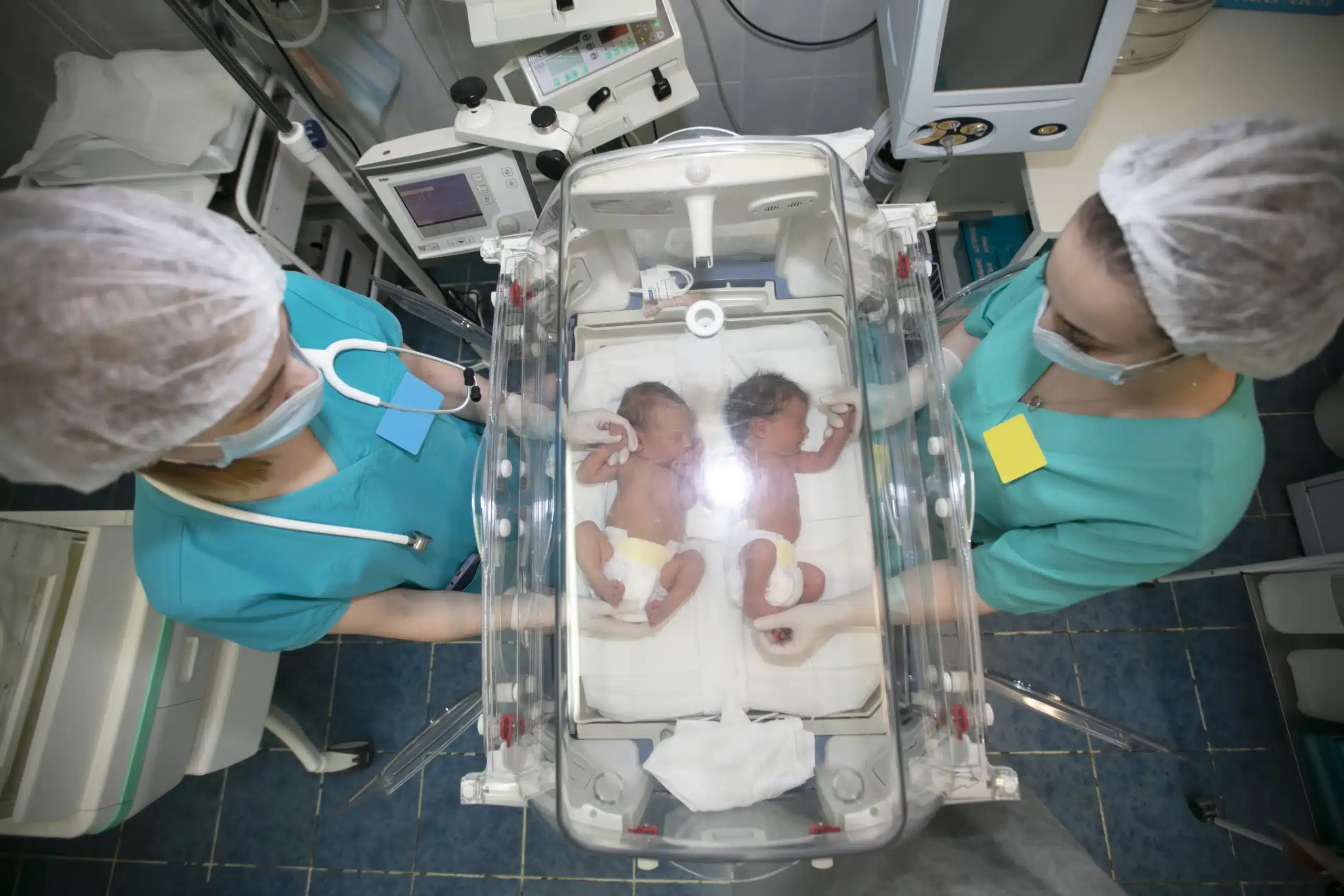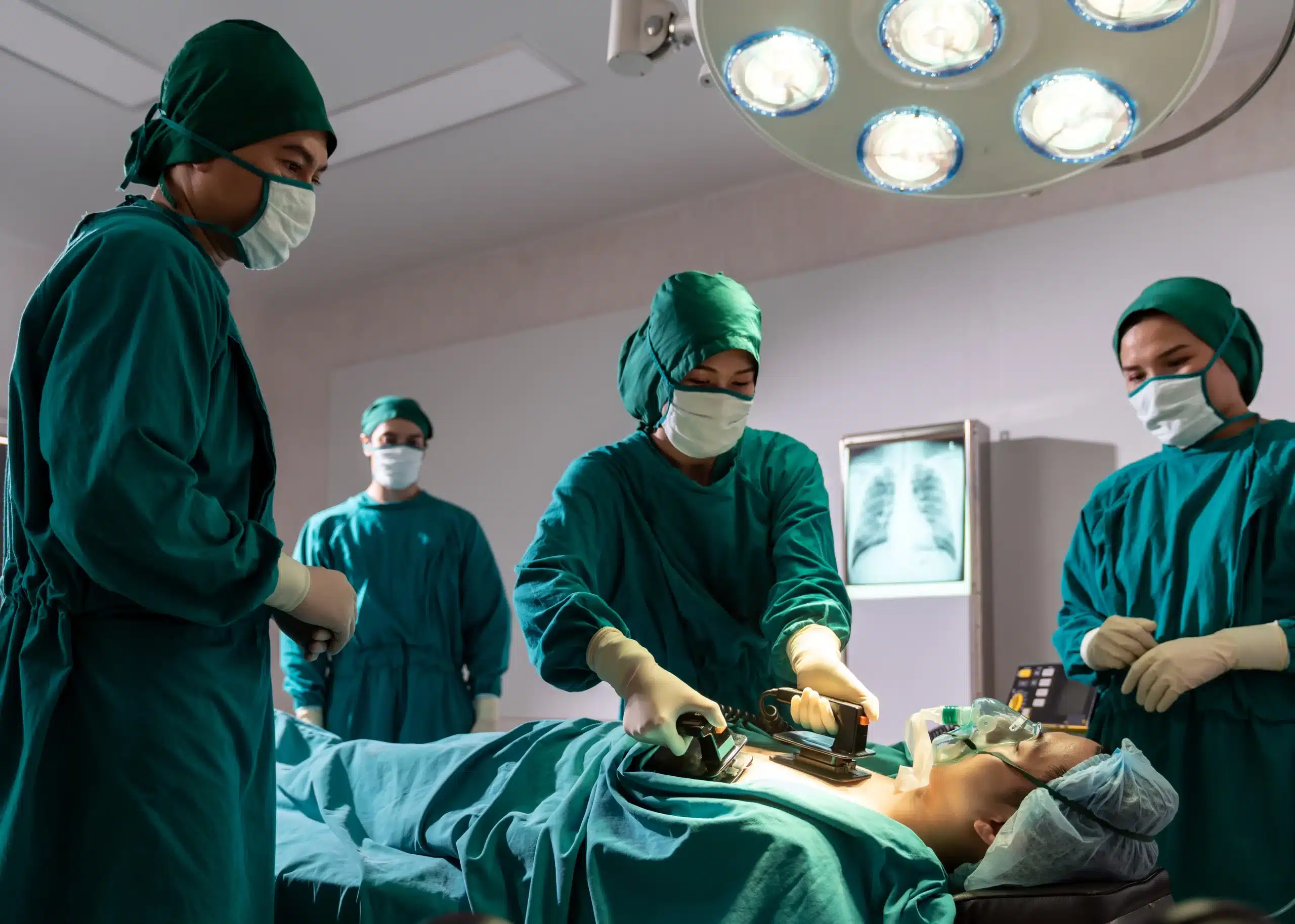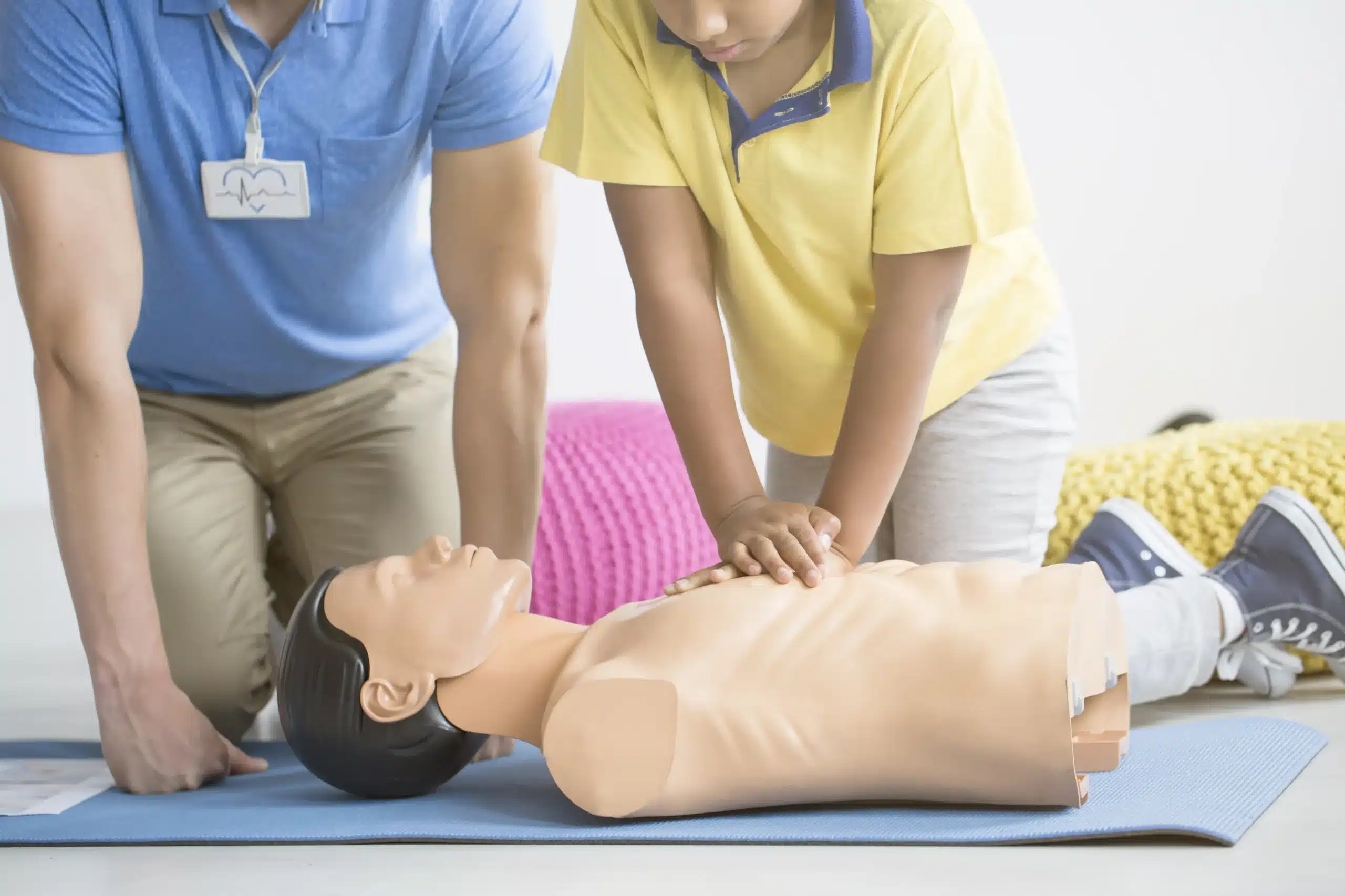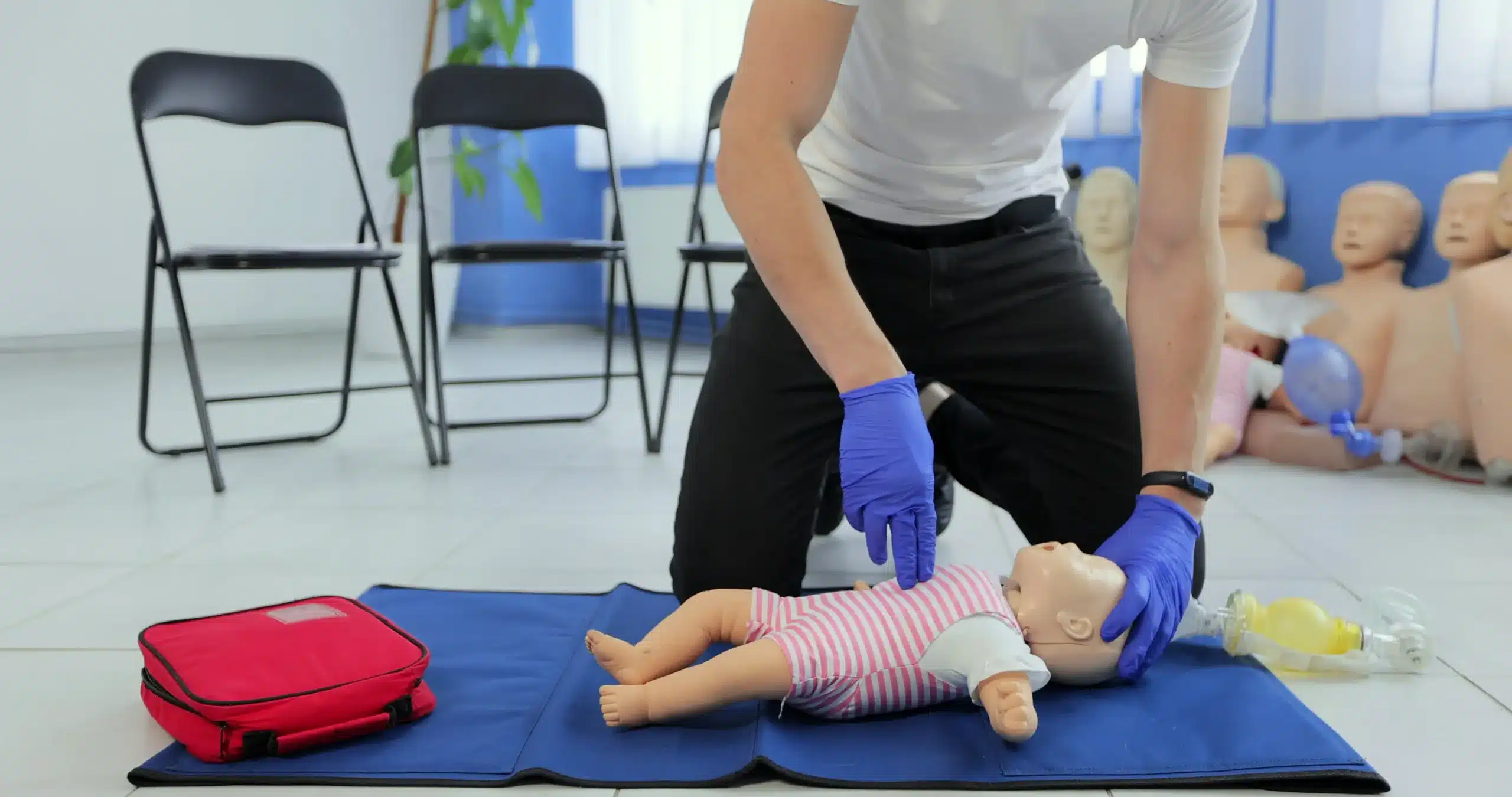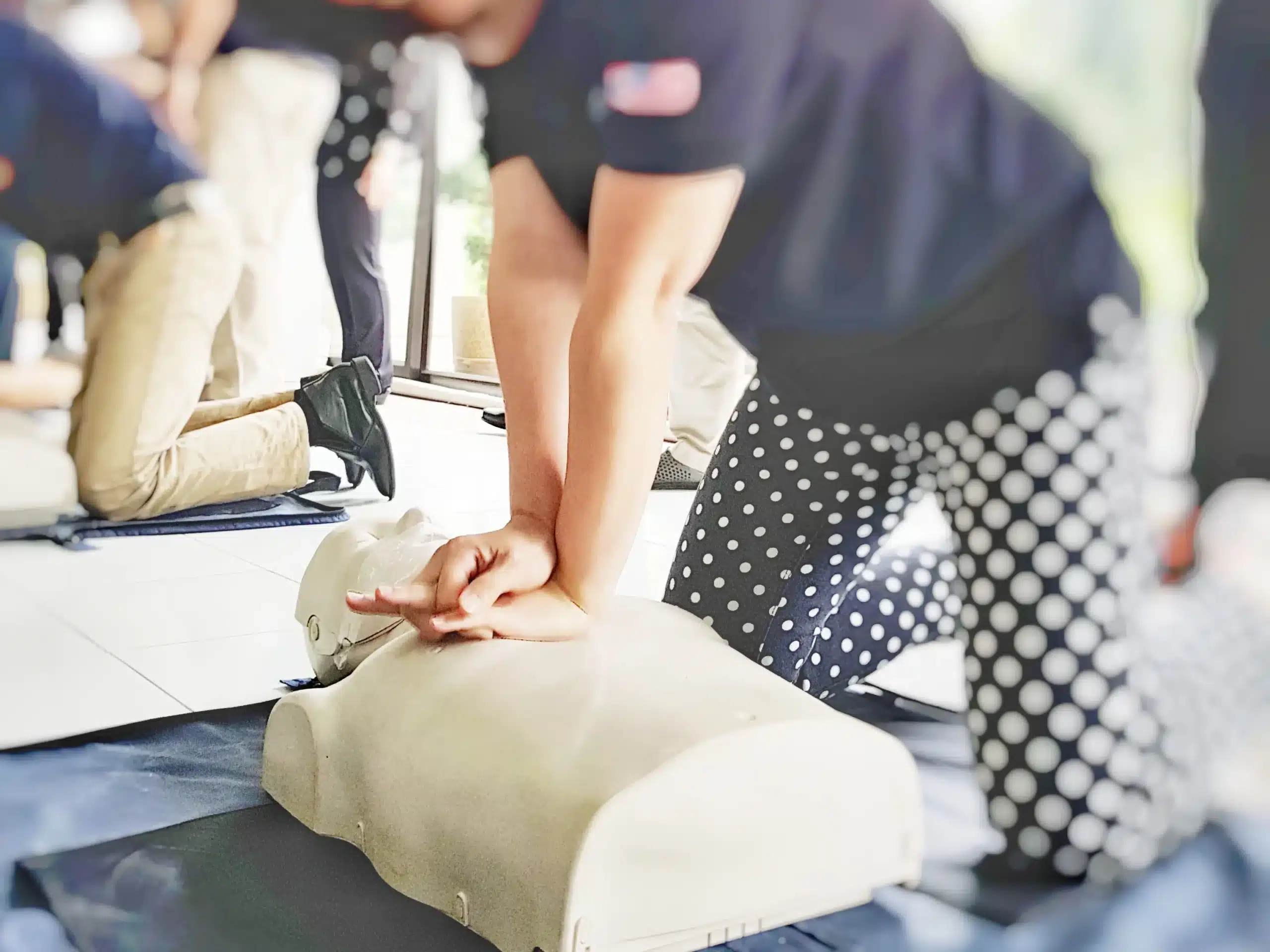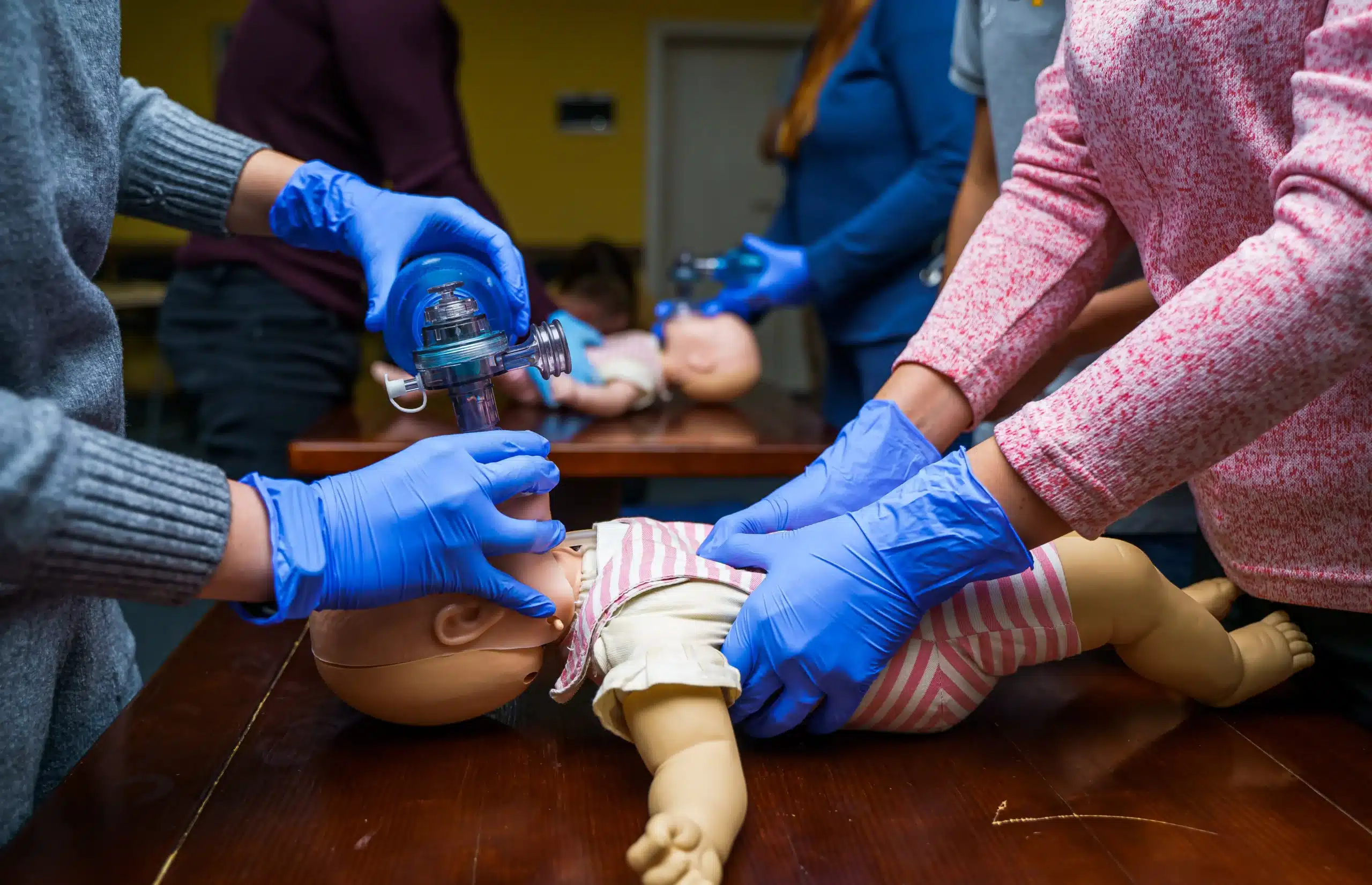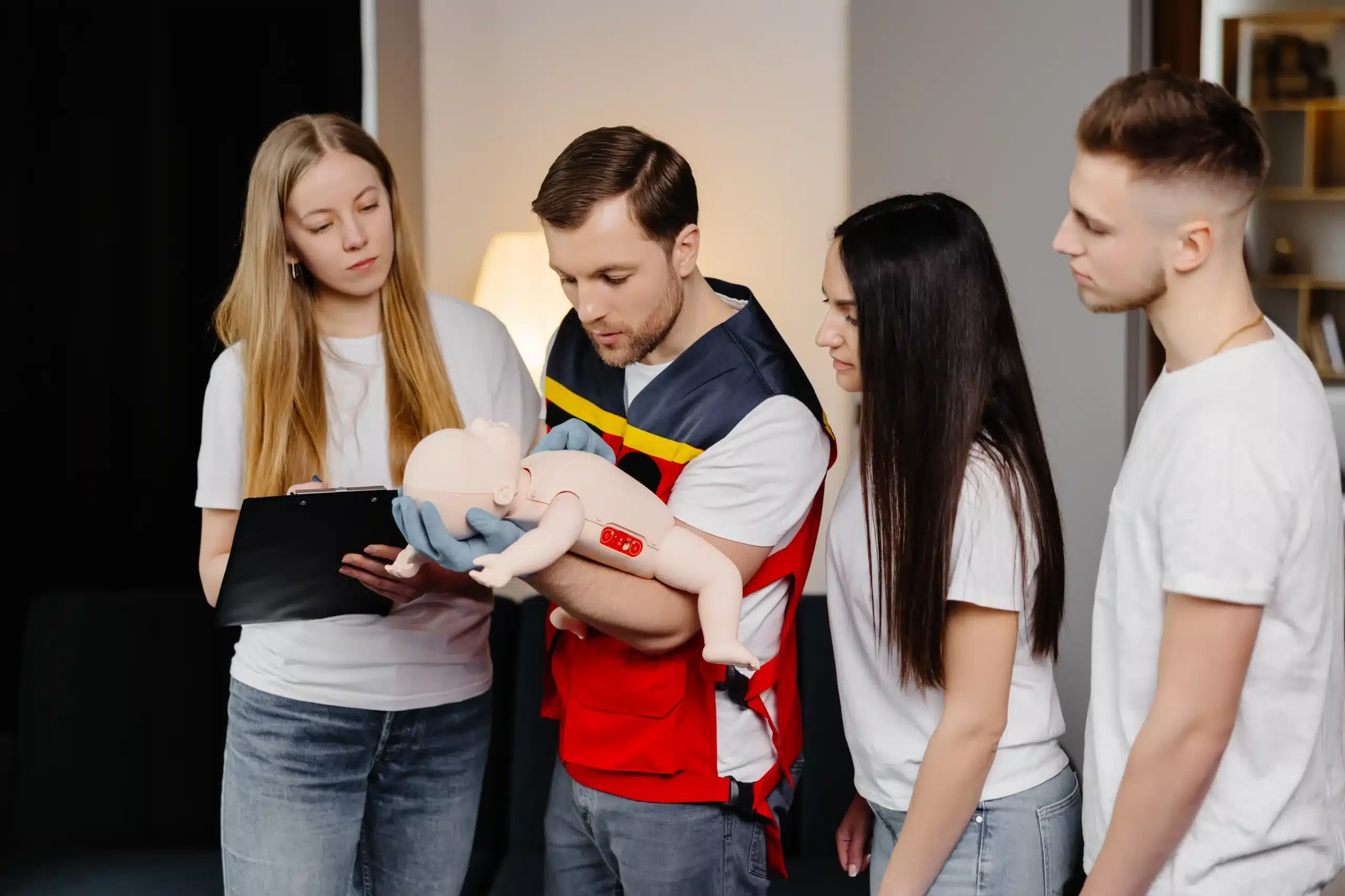Emergencies can happen anytime, anywhere. Would you know what to do? If you’re searching for “CPR certification near me,” you’re already thinking ahead. This guide will demystify CPR certification, explaining the various levels of training, from basic life support to advanced cardiovascular life support. We’ll cover who offers these certifications, the costs involved, and how to find a course that fits your schedule and learning style. Empower yourself with the knowledge and skills to respond confidently in critical situations.
Key Takeaways
- CPR certification equips you for emergencies: Whether required for your job or for personal preparedness, CPR training gives you the skills to respond effectively to life-threatening situations. Find a course that fits your schedule and learning style.
- Choose the right CPR certification: Different levels of certification exist, from basic to advanced, each designed for specific needs and career paths. Select the certification that aligns with your goals.
- CPR training offers valuable benefits: Beyond the ability to save lives, CPR certification enhances your professional qualifications and provides the confidence to act in a crisis, benefiting both you and your community.
What is CPR Certification?
CPR certification formally recognizes that someone has completed training in cardiopulmonary resuscitation (CPR) and can respond effectively in emergencies. This training equips people to perform CPR and use an Automated External Defibrillator (AED) when someone experiences cardiac arrest or other life-threatening events. It’s a vital skill for both healthcare professionals and anyone else who wants to be prepared.
The American Heart Association (AHA) offers a comprehensive course called the BLS CPR Class. This class teaches quality hands-on CPR and how to use an AED in emergencies. You’ll learn the technical skills, of course, but the training also stresses the importance of a quick, effective response. Find out more about our AHA BLS CPR certification classes.
While you’re not required to have CPR certification to perform CPR, getting certified through a recognized program ensures you’re properly trained and confident in your abilities. Taking a CPR course helps guarantee you know how to use this technique correctly and effectively. Plus, CPR certifications are typically valid for two years. After that, renewing your certification is recommended to stay up-to-date on the latest guidelines and techniques.
CPR Certification Courses
Choosing the right CPR certification course depends on your individual needs and career goals. Several recognized programs offer various levels of training, from basic life support for the general public to advanced certifications for healthcare professionals. Let’s explore some of the most common CPR certification courses.
Basic Life Support (BLS)
The BLS certification course covers core CPR skills for healthcare providers and other professionals in healthcare settings. It emphasizes high-quality CPR and the effective use of an Automated External Defibrillator (AED). You’ll learn to recognize life-threatening emergencies, provide chest compressions, deliver rescue breaths, and work as a team during a resuscitation attempt. BLS certification is often a fundamental requirement for many healthcare roles.
Heartsaver CPR and First Aid
Heartsaver courses teach basic life-saving skills to those with little or no medical background. These courses combine CPR training with essential first aid techniques. You’ll learn how to respond to common emergencies like choking, bleeding, and sudden cardiac arrest. Heartsaver CPR and First Aid certification is a good fit for teachers, coaches, childcare providers, parents, and anyone wanting to gain the confidence to act in a crisis.
Advanced Cardiovascular Life Support (ACLS)
ACLS certification goes beyond basic CPR and focuses on advanced life support techniques for healthcare professionals. This course covers a broader range of cardiovascular emergencies, including stroke, acute coronary syndromes, and respiratory arrest. ACLS training emphasizes teamwork, effective communication, and using algorithms to guide treatment decisions.
Pediatric Advanced Life Support (PALS)
PALS certification is designed for healthcare providers who care for infants and children. The course covers the specialized knowledge and skills needed to respond to pediatric emergencies, including respiratory distress, shock, and cardiac arrest. PALS training emphasizes the unique physiological differences between children and adults, ensuring appropriate interventions.
In-Person, Online, and Blended Learning
CPR certification courses are offered in various formats to suit different learning styles and schedules. Traditional in-person classes provide hands-on training with certified instructors, allowing for real-time feedback and practice. Online CPR certification offers flexibility and convenience, letting you complete the coursework at your own pace. Blended learning combines online modules with in-person skills sessions, offering a balance of independent study and practical application. Regular CPR certification renewal is also important to stay current with the latest guidelines and techniques in emergency care.
CPR Certification: Cost & Duration
Getting CPR certified is an investment in your skills and the safety of those around you. Understanding the costs, time commitment, and renewal process will help you plan for your training.
Course Costs
The cost of CPR certification varies depending on the level of training and your location. At Hayward CPR Classes, the BLS CPR course is $120, which covers the online portion, the in-person skills test, and your American Heart Association (AHA) certification card. Other providers and course types, like ACLS and PALS, may have different pricing. It’s always a good idea to contact the training center directly for the most up-to-date pricing information.
Group Discounts & Special Rates
Many training centers offer discounts for group bookings. If you’re training a team or group of colleagues, ask providers like Hayward CPR Classes about special rates. This can be a cost-effective way to ensure everyone receives the necessary training. Some locations, like our partners in Manteca, offer discounted CPR and First Aid training for larger groups.
Time Commitment
The time commitment for CPR certification depends on the specific course. For example, the BLS CPR course typically involves about one to two hours of online learning followed by a 40- to 60-minute in-person skills test. Factor in travel time to and from the testing site. This blended learning approach allows for flexible online learning combined with hands-on practice. For those looking for a faster option, some providers offer RQI classes.
Certification Renewal
CPR certifications are typically valid for two years. To maintain your skills and credentials, you’ll need to complete a renewal course before your current certification expires. Check with your certifying organization, such as the AHA or Red Cross, for specific renewal requirements. Staying current with your certification ensures you’re always prepared to respond effectively in an emergency.
Who Offers CPR Certification?
Several reputable organizations offer CPR certification courses, each with its own approach and focus. Understanding the differences can help you choose the best fit for your needs.
American Heart Association (AHA)
The American Heart Association is a leading authority on CPR training and education. Their BLS CPR class provides comprehensive instruction on performing high-quality CPR and using an AED in emergencies. AHA certifications are widely recognized and respected, especially in the healthcare field.
American Red Cross
The American Red Cross offers a range of CPR training courses, including certification options. They provide flexibility with in-person, online, and blended learning formats, making it convenient for various schedules and learning preferences. Red Cross CPR certification is suitable for both healthcare providers and the general public.
National Safety Council (NSC)
The National Safety Council provides CPR training and certification that meets OSHA requirements, making it a valuable choice for workplace safety programs. NSC certification is recognized across various industries and demonstrates a commitment to a safe work environment.
Local Training Centers
Many local training centers offer CPR certification courses, providing convenient options for individuals seeking training in their communities. These centers often offer flexible schedules and smaller class sizes for more personalized instruction. CPR Education is one example of a local provider offering CPR classes in Hayward and surrounding areas. Check with your local community centers, fire departments, or hospitals for additional training options.
Hayward CPR Classes
Hayward CPR Classes specializes in American Heart Association certification courses, including BLS, ACLS, PALS, and more. They offer daily classes in over 60 cities and guarantee the lowest prices in Alameda County. As a woman-owned AHA Training Center, they provide a supportive learning environment. Hayward CPR Classes serves Hayward, Union City, and San Leandro, focusing on convenient and affordable training. They also offer group discounts for businesses and organizations. Contact them to learn more.
CPR Certification: Requirements & Benefits
CPR certification equips you with life-saving skills, empowering you to respond effectively in medical emergencies. This section clarifies the requirements for CPR certification and outlines its numerous benefits.
Prerequisites
Interestingly, there aren’t any mandatory prerequisites for performing CPR. Anyone can step in to help during a cardiac arrest. However, formal training through a CPR course ensures you’re well-prepared and confident in your abilities. It provides the knowledge and hands-on practice needed to administer CPR correctly and effectively.
Who Needs Certification?
While anyone can learn CPR, certification is often a job requirement, especially in healthcare. For many professionals in this field, holding a valid BLS/CPR certification is non-negotiable. It signifies their competency and readiness to handle emergencies. But even outside of healthcare, CPR certification can be valuable for personal trainers, coaches, teachers, and anyone responsible for the safety of others. Consider contacting us to learn more about our CPR and First Aid classes.
Industry Requirements
Across the medical field, various roles mandate specific CPR certifications. Basic Life Support (BLS) certification is a common requirement for healthcare providers across numerous specialties. This specialized training covers core life-saving techniques essential for medical professionals. Understanding the specific requirements of your profession is crucial for meeting industry standards and ensuring patient safety. Hayward CPR classes offers ACLS and PALS training for healthcare providers.
Professional & Personal Benefits
The benefits of CPR certification extend beyond fulfilling job requirements. For healthcare professionals, it empowers them to respond swiftly and confidently during emergencies, potentially saving lives. CPR certification validates their skills in essential procedures like chest compressions, airway management, and using a defibrillator. These skills significantly improve patient outcomes and survival rates. Beyond the professional sphere, CPR certification offers personal benefits, providing peace of mind and the ability to assist loved ones or strangers in critical situations. Knowing you can make a difference in a life-or-death scenario is invaluable. For larger groups, group discounts are available.
Find a CPR Course Near You
Now that you understand the importance of CPR certification, let’s explore how to find a course that fits your needs. Whether you’re a healthcare professional, a childcare provider, or simply someone who wants to be prepared for emergencies, there are several options available.
Search Tools & Resources
Start your search by checking with nationally recognized organizations like the American Red Cross, which offers various CPR training courses, including online, in-person, and blended learning options. A quick online search for “CPR near me” will also generate local results, such as CPR training in Manteca, CA. Don’t forget to check with local community centers, hospitals, and fire departments, as they often host CPR training sessions. For those in Hayward, Union City, or San Leandro, Hayward CPR Classes offers a range of American Heart Association courses.
Choosing a Course
With so many options, how do you choose the right CPR course? First, consider your learning style. Do you prefer in-person instruction, the flexibility of online learning, or a combination of both (blended learning)? Next, think about your schedule and find a course that accommodates your availability. If you’re a healthcare provider, remember that CPR certification is often a job requirement, so choose a course that meets industry regulations.
Comparing Courses
When comparing courses, look beyond the price. Consider the course content, the instructor’s experience, and the type of certification offered. Also, keep in mind that CPR certification requires periodic renewals, so factor in the cost and time commitment for future updates. For healthcare professionals, ensure the course aligns with the latest guidelines and is accepted by your employer. Online-only CPR certifications may not meet all requirements, so verify before enrolling. Contacting the training center directly can clarify any questions. Hayward CPR Classes offers group discounts and guarantees the lowest prices in Alameda County.
Why is CPR Certification Important?
CPR certification equips individuals with life-saving skills, but its significance goes beyond the immediate act of performing CPR. It carries legal, professional, and ethical weight, especially in healthcare. Let’s explore some key reasons why
Legal Considerations for Healthcare Professionals
For healthcare providers, CPR certification isn’t just a recommendation—it’s often a legal and ethical requirement. Medical professionals are expected to maintain a certain standard of care, and providing CPR in emergencies is a cornerstone of that standard. CPR certification helps healthcare providers understand the legal aspects of medical treatment and ensures they can act swiftly and confidently in life-threatening situations. This preparedness can protect both patients and healthcare professionals from legal issues.
Improved Patient Outcomes
CPR certification directly impacts patient outcomes. Healthcare professionals with current CPR training are better prepared to respond effectively during emergencies like cardiac arrest and respiratory distress, leading to improved patient survival rates. Properly administered CPR maintains vital organ function until advanced medical help arrives, significantly increasing the chances of a positive outcome. High-quality chest compressions, airway management, and defibrillation are crucial interventions that certified healthcare professionals are trained to deliver.
Teamwork in Emergencies
Effective teamwork is essential in high-pressure medical emergencies. CPR certification fosters collaboration among healthcare teams. When everyone is CPR certified, communication improves, roles are clear, and actions are coordinated efficiently. This collaborative environment reduces errors and improves the overall quality of care during critical situations. CPR training encourages healthcare providers to work together seamlessly, ultimately benefiting the patient.
Related Articles
- CPR Training in Hayward: Your Guide – Hayward CPR Classes
- CPR Certification in Union City: Your Guide – Hayward CPR Classes
- Why CPR is Crucial in Healthcare – CPR and First-Aid Training
- Importance of Workplace CPR and First-Aid Training
- CPR Renewal in Union City: A Complete Guide
Frequently Asked Questions
How do I choose between CPR and First Aid certification? CPR focuses on life-threatening emergencies like cardiac arrest, while First Aid covers a broader range of injuries and illnesses, from minor cuts to allergic reactions. If you’re unsure which is right for you, consider your work environment and personal needs. Many courses combine CPR and First Aid training, offering comprehensive preparedness.
What if I’m already certified in CPR through a different organization? CPR guidelines are updated periodically, so even if you’re already certified, it’s wise to check if your certification is current and aligns with the latest standards. Different organizations may have different renewal requirements, so check with your certifying body for specific guidelines.
Is online CPR certification enough, or do I need in-person training? While online CPR courses offer flexibility, most recognized certifications require an in-person skills test. This hands-on component allows instructors to evaluate your technique and provide real-time feedback, ensuring you can perform CPR effectively.
How often do I need to renew my CPR certification? CPR certifications are typically valid for two years. Renewing your certification ensures you stay up-to-date with the latest guidelines and best practices, maximizing your ability to respond effectively in emergencies.
What’s the difference between BLS and Heartsaver CPR? BLS (Basic Life Support) is geared towards healthcare providers and those in healthcare settings, while Heartsaver CPR is designed for the general public. Both courses teach essential CPR skills, but BLS often includes more advanced techniques and a greater emphasis on teamwork and AED use in professional settings.
